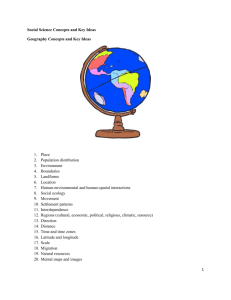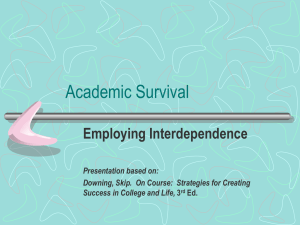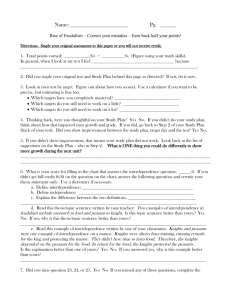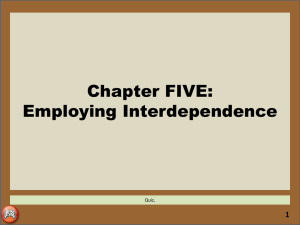Interdependence and Cooperation File - E
advertisement
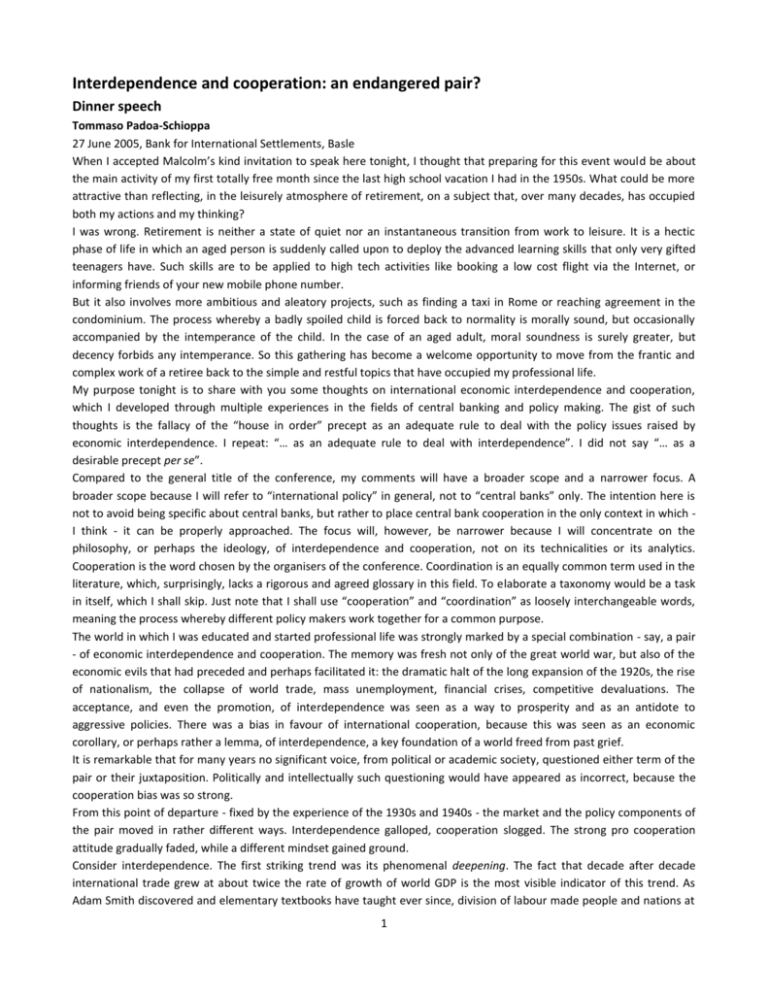
Interdependence and cooperation: an endangered pair? Dinner speech Tommaso Padoa-Schioppa 27 June 2005, Bank for International Settlements, Basle When I accepted Malcolm’s kind invitation to speak here tonight, I thought that preparing for this event would be about the main activity of my first totally free month since the last high school vacation I had in the 1950s. What could be more attractive than reflecting, in the leisurely atmosphere of retirement, on a subject that, over many decades, has occupied both my actions and my thinking? I was wrong. Retirement is neither a state of quiet nor an instantaneous transition from work to leisure. It is a hectic phase of life in which an aged person is suddenly called upon to deploy the advanced learning skills that only very gifted teenagers have. Such skills are to be applied to high tech activities like booking a low cost flight via the Internet, or informing friends of your new mobile phone number. But it also involves more ambitious and aleatory projects, such as finding a taxi in Rome or reaching agreement in the condominium. The process whereby a badly spoiled child is forced back to normality is morally sound, but occasionally accompanied by the intemperance of the child. In the case of an aged adult, moral soundness is surely greater, but decency forbids any intemperance. So this gathering has become a welcome opportunity to move from the frantic and complex work of a retiree back to the simple and restful topics that have occupied my professional life. My purpose tonight is to share with you some thoughts on international economic interdependence and cooperation, which I developed through multiple experiences in the fields of central banking and policy making. The gist of such thoughts is the fallacy of the “house in order” precept as an adequate rule to deal with the policy issues raised by economic interdependence. I repeat: “… as an adequate rule to deal with interdependence”. I did not say “… as a desirable precept per se”. Compared to the general title of the conference, my comments will have a broader scope and a narrower focus. A broader scope because I will refer to “international policy” in general, not to “central banks” only. The intention here is not to avoid being specific about central banks, but rather to place central bank cooperation in the only context in which I think - it can be properly approached. The focus will, however, be narrower because I will concentrate on the philosophy, or perhaps the ideology, of interdependence and cooperation, not on its technicalities or its analytics. Cooperation is the word chosen by the organisers of the conference. Coordination is an equally common term used in the literature, which, surprisingly, lacks a rigorous and agreed glossary in this field. To elaborate a taxonomy would be a task in itself, which I shall skip. Just note that I shall use “cooperation” and “coordination” as loosely interchangeable words, meaning the process whereby different policy makers work together for a common purpose. The world in which I was educated and started professional life was strongly marked by a special combination - say, a pair - of economic interdependence and cooperation. The memory was fresh not only of the great world war, but also of the economic evils that had preceded and perhaps facilitated it: the dramatic halt of the long expansion of the 1920s, the rise of nationalism, the collapse of world trade, mass unemployment, financial crises, competitive devaluations. The acceptance, and even the promotion, of interdependence was seen as a way to prosperity and as an antidote to aggressive policies. There was a bias in favour of international cooperation, because this was seen as an economic corollary, or perhaps rather a lemma, of interdependence, a key foundation of a world freed from past grief. It is remarkable that for many years no significant voice, from political or academic society, questioned either term of the pair or their juxtaposition. Politically and intellectually such questioning would have appeared as incorrect, because the cooperation bias was so strong. From this point of departure - fixed by the experience of the 1930s and 1940s - the market and the policy components of the pair moved in rather different ways. Interdependence galloped, cooperation slogged. The strong pro cooperation attitude gradually faded, while a different mindset gained ground. Consider interdependence. The first striking trend was its phenomenal deepening. The fact that decade after decade international trade grew at about twice the rate of growth of world GDP is the most visible indicator of this trend. As Adam Smith discovered and elementary textbooks have taught ever since, division of labour made people and nations at 1 the same time less self-sufficient, more mutually dependent and richer. The widening of interdependence, however, was not less striking. It was a geographical widening, as the number of active participants in the global division of labour increased to the point of including almost every country of the planet. But it was also an economic - or functional widening, as cross border mobility and exchanges extended from the original fields of finished goods and raw materials to intermediate goods, services, capital and labour. All in all it is not an exaggeration to say that today interdependence across nations is far greater than interdependence within nations was two or three generations ago. Consider now cooperation. “Slogging” may sound like a harsh and undeserved word and let me say immediately that I presume to fully acknowledge - and even to have occasionally contributed to - some remarkable progress in international cooperation over the last three decades. Membership in international organisations, institutions and forums (be they the IMF, the World Bank, or the OECD, not to mention the BIS itself) grew in line with the geographical widening of interdependence. New forums such as the BCBS, the CPSS and the FSF were created. The agenda of cooperation widened to include fields like banking supervision, securities regulation, or payment systems, which were previously the preserve of national authorities. Still, there are good reasons, in my view, to maintain my choice of words. The inevitable collapse of the Bretton Woods regime deprived the international system of a strong and accepted mechanism to impose adjustment of imbalances. The ideology of unrestricted national sovereignty made a powerful comeback. Most of all, cooperation did not progress at the same phenomenal pace at which interdependence did. The gap between needs and accomplishments actually widened. Given this, I would like to discuss the intellectual argument underpinning what I have called the “slogging” of cooperation. To be sure, the key reason for the slogging is not an intellectual argument, but rather a hard fact; the fact that an increase in policy cooperation faces formidable obstacles that do not exist for economic integration. The two terms of the pair interdependence and cooperation - are indeed driven by different agents, subject to different constraints, and moved by different aims. Interdependence is driven by the self-interest of firms and households, which maximise utility functions with no regard for political borders. There is no equivalent self-interest for the actors of policy cooperation, which are mainly entrusted with the task of pursuing a national interest, directly elected by the citizens or accountable to elected bodies. This fundamental asymmetry explains the different speeds at which the two terms have evolved. These are facts. But the influence of ideas should not be underestimated. And a conference of academics and policy makers is the right venue to exchange intellectual arguments. The intellectual argument developed by policy makers and scholars to provide a rationalisation of the widening of the gap can be put under the general name of “house in order doctrine”. The house in order doctrine states that if each and every national policy player kept its house in order, then the world itself would be in order. In this case there is no special need for policy cooperation or coordination, no need for any prior commitment to act together, no need for collective decisions resulting from a policy give-and-take. At most, what is needed in addition to good housekeeping is a regular exchange of information. The doctrine is not formulated in the literature in the way I have stated it, but rather popularised by economists and policy makers. It is a collection of arguments, rather than a single economic theorem. Yet it can often be encountered in policy documents of national and international institutions as well as in the nontechnical writings of prominent economists. Moreover, the doctrine claims powerful academic credentials. So, let me now turn to such claims and briefly examine the two main ones. The first claim of the house in order doctrine is to be the legitimate heir of the tradition of economic liberalism. Already John Stuart Mill had argued that “it is in general a necessary condition of free institutions that the boundaries of governments should coincide in the main with those of nationalities”. And the Zollverein advocated by Friedrich List was internally market oriented and externally protectionist. Later, in the mid-20th century, the main argument against international policy coordination was that this would create an international leviathan increasing government intervention. This argument, however, does not stand against the compelling theoretical argumentation of leading liberal thinkers and is inconsistent with the lesson of history. As to theoretical thinking, such eminent liberal economists as Hayek, Einaudi and Robbins had conclusively demonstrated the difference between the decision on how activist the state should be in economic policy and the allocation of power across different levels of government. On the first, they favour strong limits to public intervention, but on the second, they espouse the creation of an international level of government for its peacekeeping and wealth-generating impact. 2 With the swing in the pendulum of ideas and policies away from activism, two pairs of attitudes have been arbitrarily formed: government intervention cum international cooperation, on the one side; market orientation cum national egoism on the other. It has been wrongly argued by Friedman and his followers that rejecting the form of policy activism that was dubbed “Keynesianism” needed to automatically entail opposition to the cooperative spirit that characterised the post-World War II years. In reality, describing international cooperation as an exclusive feature of an interventionist state is a major conceptual mistake. It confuses the sphere of economics with the sphere of politics. To combine the concept of the minimal state with that of a strong, and yet limited, supranational level of government is certainly more congenial to the legacy of liberal thinking than to any other economic or political doctrine. Such a government should be imbued with the power to enforce free trade, openness of economic frontiers, non-discrimination and the international rule of law. As to history, it would be wrong to attribute the collapse of the pre-1914 world to the rise of illiberal domestic policies. At the time, the role of the state in economic and social policies was still minimal. And even before liberal economic policies deteriorated, the foreign policies of the nation states had taken a turn towards militarism. Already in the mid-19th century, a split had emerged between liberal domestic policies and an aggressive foreign policy. In the period before 1914, very little was left of the combination of political, economic and cultural elements of the golden years of the 19th century. The shot of a pistol was sufficient to make the edifice crumble. World War I was the effect of the unsustainability of the preceding order, not the cause of its fall. The second claim of the house in order doctrine is to be the robust discovery of recent economic research, supporting the proposition that international policy cooperation is not desirable and may be counterproductive. Scrutiny of this recent literature is somewhat awkward for a policy maker, not regularly frequenting the research laboratory and, at best, only familiar with penultimate generation analytical tools. The body of the literature is large and still growing, often analytically sophisticated and difficult to read. Yet, let me state in simple terms the three reasons why the recommendation to refrain from structured international policy coordination looks ill conceived to me. The first reason is that the scholarly debate is far from concluded. It is in the typical phase in which different results are collected presenting different conclusions, which are strictly dependent on the chosen assumptions. There is no “general theory” for the time being. For every paper advising against cooperation there is another paper recommending it. The second and far more important reason is that the debate is, by construction, somehow off the mark. Indeed, most of the literature explores circumstances in which cooperation produces a better or an inferior outcome compared to the result produced by “going it alone”. One is tempted to ask: “and so what?”. What is the ultimate value of this collection of examples? The optimal policy line and the optimal policy level must not be confused and require different types of investigation. I wonder if this literature is not simply discovering the obvious, i.e. that a policy maker or a government can make mistakes? But is this a reason to do without it? Is the fact that the US Fed presumably made policy mistakes in the 1930s a good argument to conclude that a central bank should not have been created? The third and related reason is the failure to rigorously define the non-coordination regime. Often, the anti-cooperation authors loosely speak of policy competition as the alternative. Of course, “competition” sounds better than “conflict”. But how to draw the line which separates the two? What we know is that the distinction is exceedingly difficult and controversial both analytically and practically. What we also know, however, is that competition, unlike conflict, requires a strong framework of agreed and enforceable rules. And how could this strong framework come into existence if not through an extraordinary cooperative effort by the would-be competitors? My impression is that the scholar sometimes forgets to strip down his ideological conviction and leave it at the door before entering the laboratory. And let me say that it is somewhat amazing to see authors like Rogoff using completely different linguistic and analytical precautions in the “pop” and in the “lab” versions of their thinking. One may ask: which of the two inspires the other? Let me conclude. Policy making consists, by definition, in pursuing the public interest. But what does “public” mean? It may mean different things for different communities and if the optimum government is to be neither below nor above the level at which an interest needs to be recognised as public, then a multi-tier government is necessary. The choice of the appropriate level relates to the definition of the area in which a good is in fact public, i.e. whether it is a local public good or whether, at the other extreme, it is a world public good. 3 As interdependence broadens and deepens so does the “public” domain, because the economic and the political order are fundamentally interlinked. Here is the sense of the pair. Policy coordination is the way to deal with this broadening and deepening in a world in which political borders exist and the nation state preserves the largest portion of public power. Inevitably, cooperation among national public actors entails a reduction in the independent decision making power of national institutions. The reluctance to confer portions of the national power to international forums and institutions is based on a model of sovereignty according to which government should remain undivided, be kept as a single and monolithic block. This model originated with the Westphalian order, took strength from the Jacobin movement during the French Revolution and was increasingly engrafted in the course of the 19th century, first with the idea that nation and state should coincide, then with the rise of representative government and the advent of universal suffrage. But it was this same evolution that set the conditions for the rise of nationalism and the catastrophe of 1914-45. While the memory was still fresh, the lessons from history and politics impregnated the thinking of economists and the attitudes of policy makers; hence the balance on which the pair was set in shaping the post-World War II world. As time passes, however, memories grow dim and the risk augments that the pair will shift off balance. Just as politicians, according to Keynes, are the slaves of some defunct economist, so economists and officials tend to be the slaves of some defunct historian or political thinker. They risk neglecting the fact that in a globalised world unlimited national autonomy does not exist any longer and that sovereignty can in fact be regained - rather than lost - when delegating tasks to supranational forums and institutions. As Robert Cooper puts it in his recent The Breaking of Nations: “For the post-modern state, sovereignty is a seat at the table”. 4

